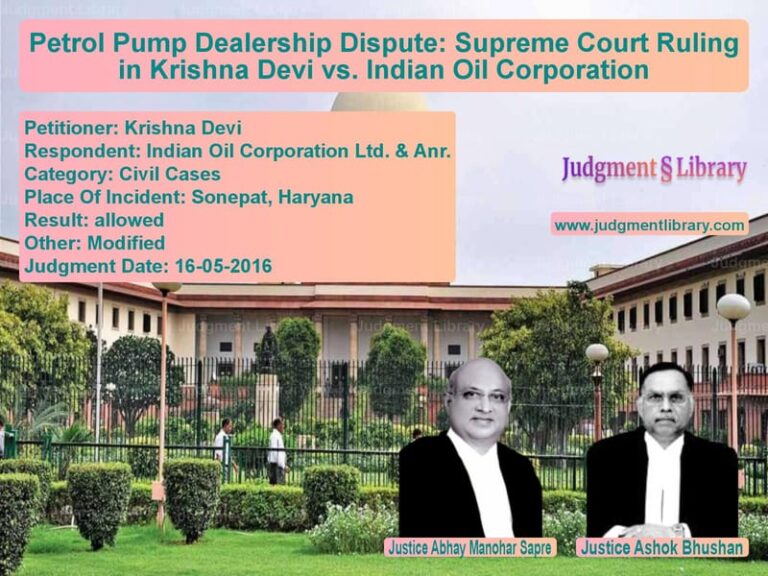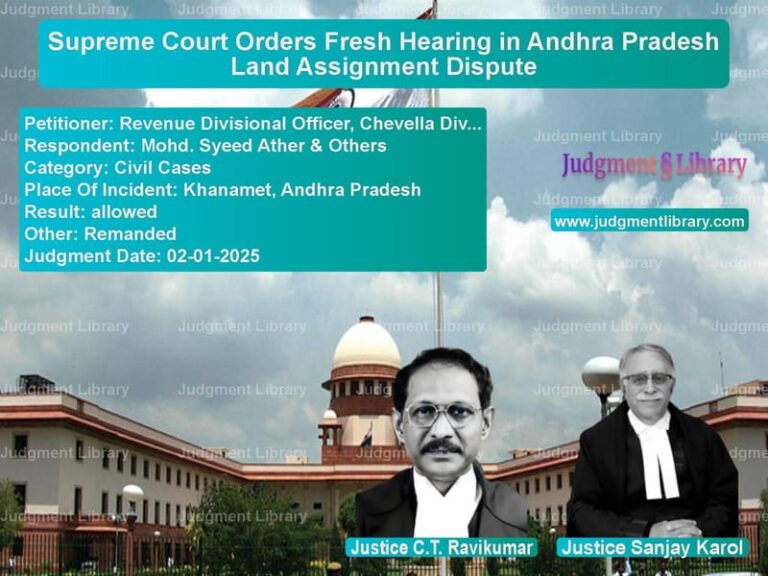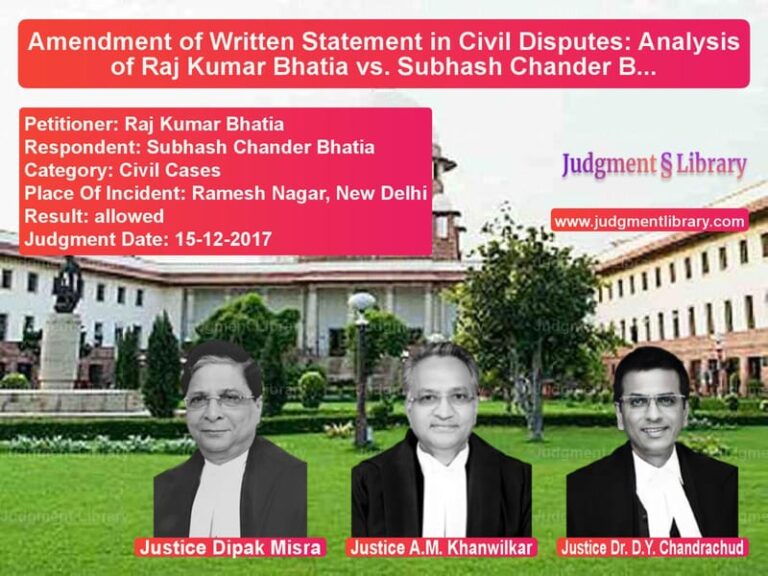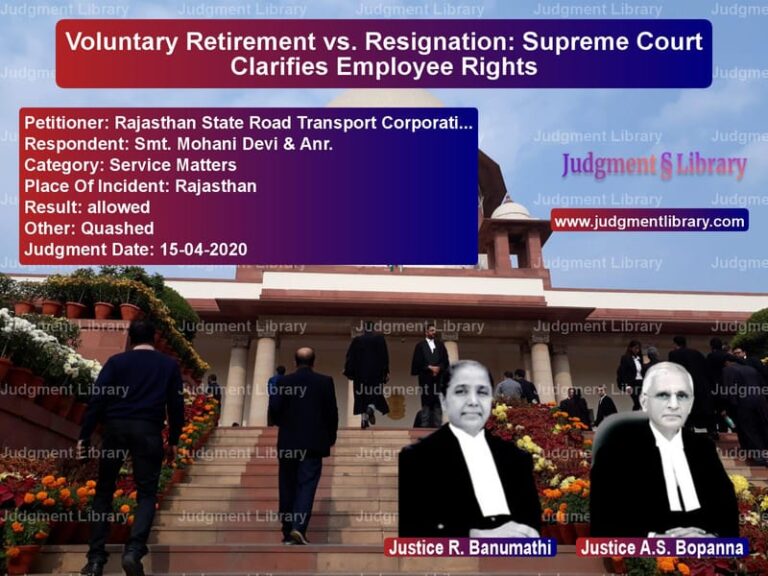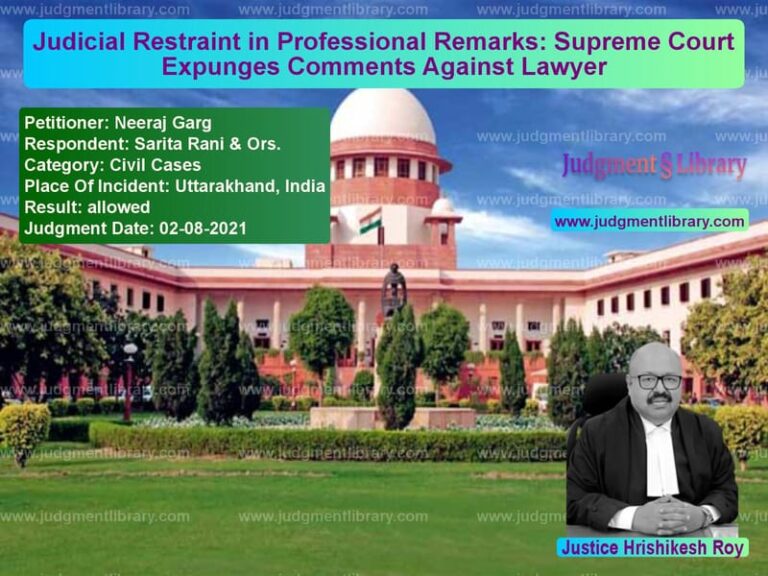Wrongful Conviction and Fair Trial: Supreme Court Acquits Six in 2003 Nashik Dacoity and Murder Case
The case of Ankush Maruti Shinde & Ors. vs. State of Maharashtra is one of the most significant rulings in recent times, dealing with wrongful conviction, fair trial, and the responsibility of the prosecution in ensuring justice. The Supreme Court of India, in its judgment dated March 5, 2019, acquitted six individuals who had been convicted and sentenced to death in a horrific crime involving multiple murders and sexual assault. The judgment not only exposed grave lapses in the investigation but also called for an inquiry into the actions of the investigating officers.
The case involved the brutal murder of five family members and the rape of two women in Nashik, Maharashtra, in 2003. The accused were arrested and convicted based primarily on eyewitness testimony, without any corroborating forensic evidence. The Supreme Court, after reviewing the evidence, ruled that the prosecution had failed to prove the case beyond a reasonable doubt and that the accused had been wrongly convicted.
Background of the Case
The incident occurred on the night of June 5-6, 2003, in a hut in a guava orchard in Nashik. The victims, members of a family, were attacked by unknown assailants who entered the hut armed with weapons. The perpetrators looted the house, assaulted the men, raped the women, and left the scene believing all the victims were dead.
The crime scene was discovered the next morning by a relative, who alerted the police. Two victims, Manoj Satote (PW1) and Vimalabai (PW8), survived the attack and became the key eyewitnesses in the case.
Legal Issues Raised
- Whether the accused were properly identified as the perpetrators.
- Whether the prosecution suppressed material evidence affecting the fairness of the trial.
- Whether forensic evidence supported the prosecution’s case.
- Whether the accused were wrongly convicted based on unreliable testimony.
Arguments by the Petitioners (Ankush Maruti Shinde & Ors.)
The defense, led by Senior Advocate Dr. Yug Mohit Chaudhary, raised several crucial arguments:
- The identification of the accused was unreliable and based on contradictory eyewitness statements.
- The prosecution suppressed the fact that PW8 had earlier identified four different individuals from police photo albums as the culprits.
- No forensic evidence (DNA, fingerprints, blood samples) linked the accused to the crime scene.
- The accused were from nomadic tribes and were arrested a month later on transfer warrants, without any initial description from the witnesses.
- Delay in conducting Test Identification Parades (TIPs) weakened the reliability of the eyewitness testimony.
Arguments by the Respondent (State of Maharashtra)
The prosecution contended:
- The accused were identified in court and in TIPs by the two surviving victims.
- The injuries on the accused were consistent with resistance from the victims.
- The recovery of a broken silver chain from one of the accused was proof of their involvement.
- The lack of forensic evidence did not undermine the case, as eyewitness testimony was sufficient.
Supreme Court’s Judgment
The Supreme Court acquitted all six accused, citing multiple lapses in the prosecution’s case:
- Unreliable Eyewitness Testimony: PW8 had initially identified four different individuals in a police photo album two days after the crime, but the prosecution suppressed this fact.
- Absence of Forensic Evidence: No DNA, fingerprint, or blood evidence linked the accused to the crime scene.
- Deliberate Suppression of Evidence: The investigating officers did not pursue the leads from PW8’s initial identification.
- Delayed Test Identification Parades: The TIPs were conducted 50 days after the incident, raising doubts about their reliability.
- Failure to Investigate the Real Culprits: The police arrested the accused based on assumptions rather than solid evidence.
The Court ruled:
“The prosecution has failed to prove the case beyond a reasonable doubt. The investigation was not fair and honest. The prosecution suppressed material facts from the Court. We, therefore, acquit the accused.”
Key Takeaways from the Judgment
- Fair investigation is essential: Suppressing exculpatory evidence can lead to wrongful convictions.
- Forensic evidence is crucial: In serious crimes like rape and murder, forensic support strengthens cases.
- Eyewitness testimony must be corroborated: Testimony alone, especially when inconsistent, cannot form the sole basis for conviction.
- Delayed identification weakens prosecution cases: Immediate identification is more reliable.
- Wrongful convictions must be addressed: The Court ordered compensation for the accused and action against erring officers.
Conclusion
The Supreme Court’s ruling in Ankush Maruti Shinde & Ors. vs. State of Maharashtra serves as a landmark case highlighting the importance of fair trials and proper investigations. By acquitting the accused, the Court reaffirmed the principle that justice should not be compromised by procedural lapses and wrongful prosecution.
In addition to acquitting the accused, the Court ordered:
- The Maharashtra Government to pay Rs. 5 lakh compensation to each of the accused.
- A fresh investigation under Section 173(8) of the Criminal Procedure Code into the four individuals identified by PW8.
- Departmental action against the erring police officers.
This judgment is a reminder that wrongful convictions not only destroy lives but also allow the real perpetrators to go unpunished. The ruling calls for accountability in law enforcement and ensures that justice prevails in the Indian legal system.
Petitioner Name: Ankush Maruti Shinde & Ors..Respondent Name: State of Maharashtra.Judgment By: Justice A.K. Sikri, Justice S. Abdul Nazeer, Justice M.R. Shah.Place Of Incident: Nashik, Maharashtra.Judgment Date: 05-03-2019.
Don’t miss out on the full details! Download the complete judgment in PDF format below and gain valuable insights instantly!
Download Judgment: Ankush Maruti Shinde vs State of Maharashtra Supreme Court of India Judgment Dated 05-03-2019.pdf
Direct Downlaod Judgment: Direct downlaod this Judgment
See all petitions in Murder Cases
See all petitions in Bail and Anticipatory Bail
See all petitions in Judgment by A.K. Sikri
See all petitions in Judgment by S. Abdul Nazeer
See all petitions in Judgment by Mukeshkumar Rasikbhai Shah
See all petitions in allowed
See all petitions in Quashed
See all petitions in supreme court of India judgments March 2019
See all petitions in 2019 judgments
See all posts in Criminal Cases Category
See all allowed petitions in Criminal Cases Category
See all Dismissed petitions in Criminal Cases Category
See all partially allowed petitions in Criminal Cases Category


